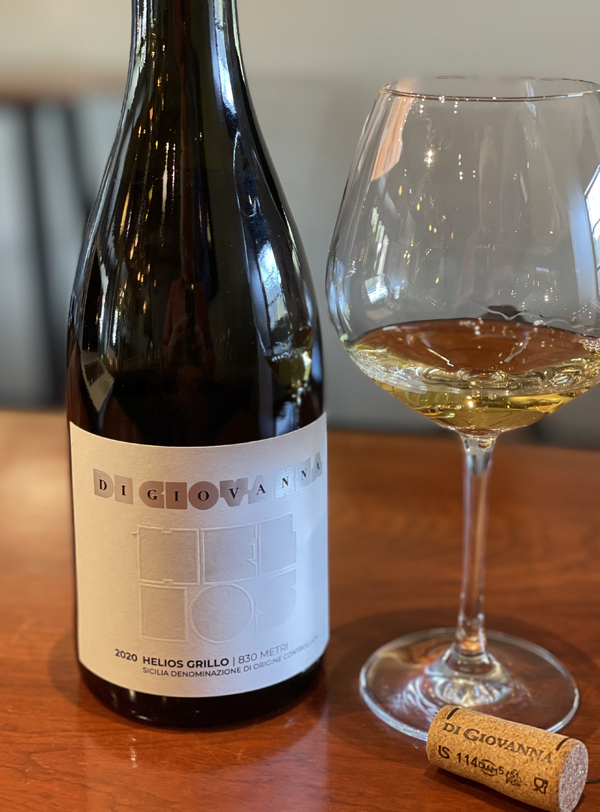2020 Di Giovanna, Helios Grillo, Sicilia DOC Bianco, Sicily, Italy.
Grown not on volcanic, but instead on limestone soils, the mineral driven and aromatic golden colored Helios Grillo is a light to medium bodied white that captures its high elevation terroir in the glass with crisp green apple, lemon/lime, tart quince and kumquat fruits, wet chalky stones, saline, wild herbs and a phenolic, almost tannic dry finish, refreshing but firm in structure. Grillo, thought of as an indigenous or native varietal in Sicily has an unclear background, but has been getting the attention it deserves as a solo varietal and as a blender, it can even be found in the amphora raised skin macerated COS Pithos white by Giusto Occhipinti and in his niece’s wines, with Arianna Occhipinti doing her Tami white with 100% Grillo and adding a little of it with Zibibbo for her 68 Bianco, all showing the range of this grape. Grillo, thought to be a crossing of Catarratto and Moscato di Alessandria (called Zibibbo in Sicily) grapes, was once used exclusively in Marsala production, but has since started to gain traction as an alternative white wine throughout the southern, non volcanic zones of Sicily and along with Carricante, which enjoys the volcanic soils, have become highly desirable and make for very stylish if not brilliant wines. Interestingly, before DNA mapping, Grillo, which is also known as Riddu and Rossese bianco, is a white grape variety that can withstand high temperatures and though Its origins are uncertain, but it may have been introduced into the island of Sicily from Apulia and was documented as being planted in the province of Trapani by 1897. Today it is grown throughout Sicily where it has achieved maybe its best and most successful results and it is also in the Aeolian Islands, as well as growing around the commune of Riomaggiore in the province of La Spezia in Liguria, where Grillo is called Rossese bianco. As Di Giovanna’s 2020 Helios Grillo opens and warms it takes on a more creamy feel and picks up hints of white flowers and Summer melon, as well as a fine bitter peach pit element, it’s a serious version of the grape and best with food, with swordfish steaks coming to mind as a nice pairing for it.
Based in Agrigento, the Di Giovanna winery is one of Sicily’s oldest family estates with five generations making wine and exceptional olive oil here with vineyards set at elevation in the Monte Genuardo mountain range, an uplifting of marine sediments. The Di Giovanna’s property and wine cellar have been certified organic since 1997 and they proudly have been leaders in sustainability on this beautiful and diverse Mediterranean island which has both European and African climate influences. The winery also notes that they five family vineyards that are situated in the small DOC’s of Contessa Entellina and Sambuca di Sicilia, where this wine comes from, but it should be noted that Di Giovanna is most known for their Nero d’Avola reds, in particular the Helios Nero d’Avola. The Helios Grillo is the flagship white wine of the Di Giovanna family, it is sourced exclusively from a high mountainside single vineyard that sits at just over 830 meters (2723 FT) above sea level in the Fiuminello area of the Sabuca di Silicia zone. The conditions here are perfect to craft aromatic and zesty whites, like the Helios Grillo captures in the bottle. With a limited production of only 3000 bottles per vintage, this is a beautiful rarity that is a great alternative to many generic offerings that litter this price point. Additionally, as the winery notes, this wine is certified organic and vegan-friendly! Siblings Gunther and Klaus Di Giovanna have embraced organic farming many years ago, as have many of Sicilia DOC wineries, looking to made soulful and authentic wines and even the appellation or DOC authorities here actively support sustainable practices and (it) is playing a crucial role in organic wine production on the island. The Di Giovanna Grillo is made with 100% Grillo and is soft and slowly whole cluster pressed off the skins for 8 hours and then fermented mainly in stainless steel tank, but with about 10% seeing French oak fermentation and aging to add a bit of richness and roundness. The wine is rested on the fine lees for close to 9 months, both in the stainless tank and the wood Tonneaux, which adds to the mouth feel and complexity in this Helios Grillo and allows for this wine’s cuisine flexibility, though of course it goes best with fresh sea foods.
($25 Est.) 92 Points, grapelive
